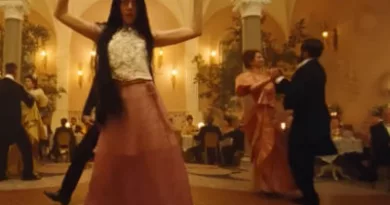The Long Walk: Mark Kermode’s scifi movie review (video).
Stephen King’s The Long Walk has been threatening to reach the screen since the late Palaeolithic era (or 1988, which in adaptation years feels the same thing). George A. Romero flirted with it. Frank Darabont kicked the tyres. New Line waved it about like a golden ticket. And now, finally, in 2025, Lionsgate and Francis Lawrence (The Hunger Games films) have actually marched it across the finish line – and our man-of-many-movies, Mark Kermode, is here to bring you his review of the film in this here video (see above).
Yes, gentle reader, the most depressing fun-run in fiction is now a major motion picture.
The premise is simple, brutal, and entirely King-as-Bachman. In a dystopian America ruled by a fascist regime, fifty teenage boys are set loose in an annual walking contest. Keep above three miles an hour or you’re shot on the spot. Last one standing gets fame, fortune, and a wish for anything he wants. Everyone else? They’re mulch for the roadside. It’s part Hunger Games, part endurance sport, and part existential death march.
Our protagonist is Raymond Garraty (Cooper Hoffman, carrying a genetic whiff of his late father Philip Seymour Hoffman’s haunted gravitas), who enters the Walk not out of teenage bravado but because his father was executed by the ruling Major (Mark Hamill, relishing his role as the showman authoritarian). Garraty wants revenge. Along the way he befriends fellow walker Peter McVries (David Jonsson, excellent), spars with the loathsome Barkovitch (Charlie Plummer), and encounters the doomed hopes, blisters, and breakdowns of boys forced into the cruelest of marathons.
Francis Lawrence directs with the same glossy cruelty he brought to The Hunger Games, but here the spectacle is pared back. This isn’t about Katniss firing flaming arrows; it’s about kids wetting themselves while soldiers count down their warnings. Winnipeg doubles for the endless American highway, bleak as a graveyard. Jeremiah Fraites’ score throbs like a pulse giving out. And the camera lingers on shoes, blisters, and sweat—reminders that this is science fiction stripped down to its bones: a simple “what if” premise walked out to its merciless conclusion.
The performances are where the film shines. Hoffman gives Garraty a quiet desperation that’s hard to shake, while Jonsson makes McVries both bitter and oddly noble. There’s strong support from Garrett Wareing as the sickly Stebbins, and Hamill is clearly having the time of his life chewing scenery as the sadistic Major. Judy Greer and Josh Hamilton add fleeting humanity as Garraty’s grieving parents.
Critics seem to be on board—Rotten Tomatoes has it sitting at a plump 93%, with the consensus being that it’s as pitiless as the novel but surprisingly moving. Here at SFcrowsnest, we’d agree: The Long Walk isn’t popcorn fare, but it’s a rare studio adaptation of King that captures his early Bachman-era nihilism. It’s grim, sweaty, repetitive—and utterly compelling.
SPOILERS AHEAD: BEWARE >>
And the ending? Without spoiling too much, the film honours King’s grim tone while making one significant shift: in this version, Garraty sacrifices himself so McVries can win—and McVries immediately cashes in his prize to put a bullet in the Major. It’s a bleak victory, yes, but one with a tiny spark of rebellion.
So lace up your boots, keep your pace above three miles an hour, and don’t look back. Cinema’s cruelest endurance test has finally begun.






